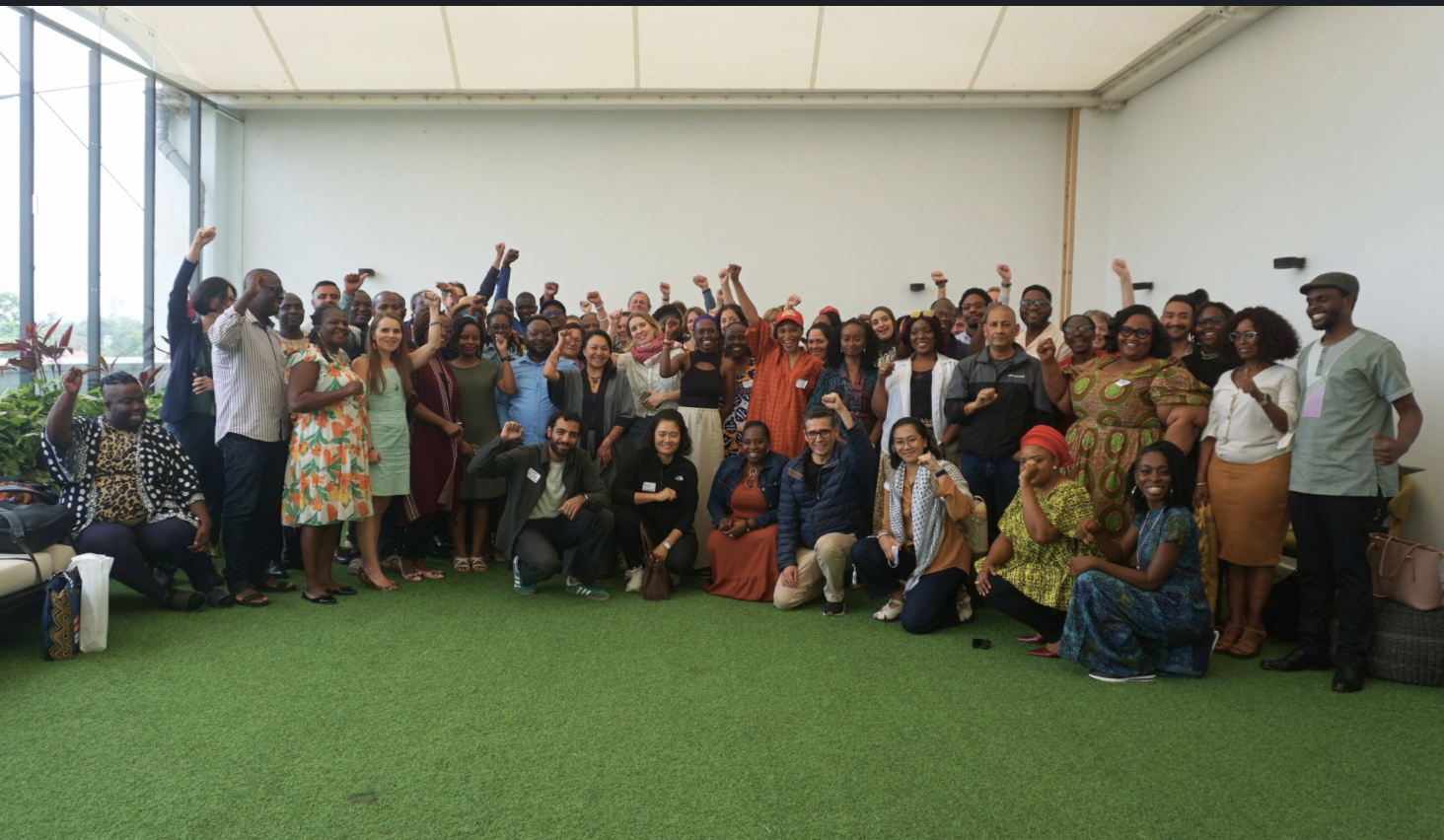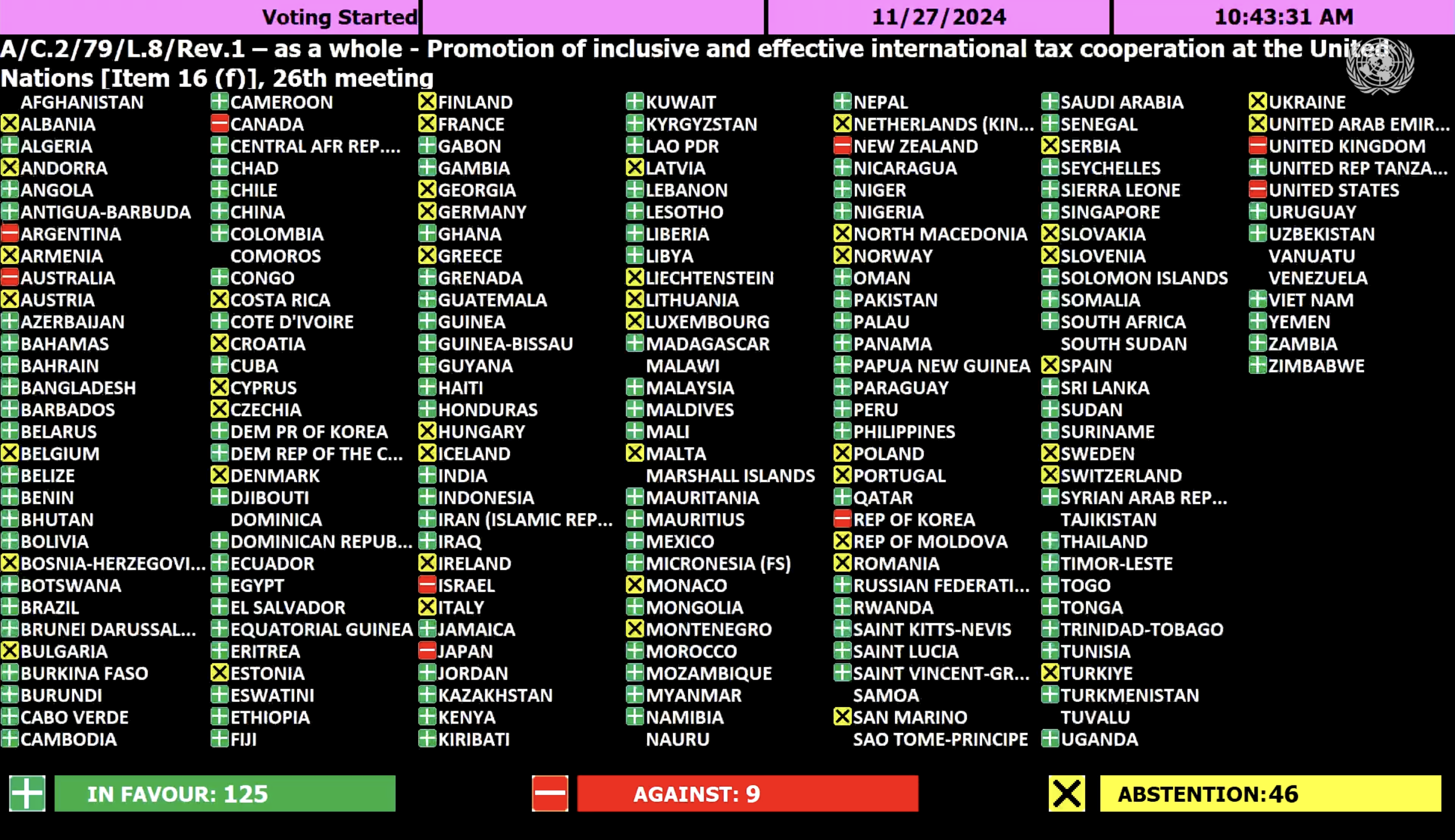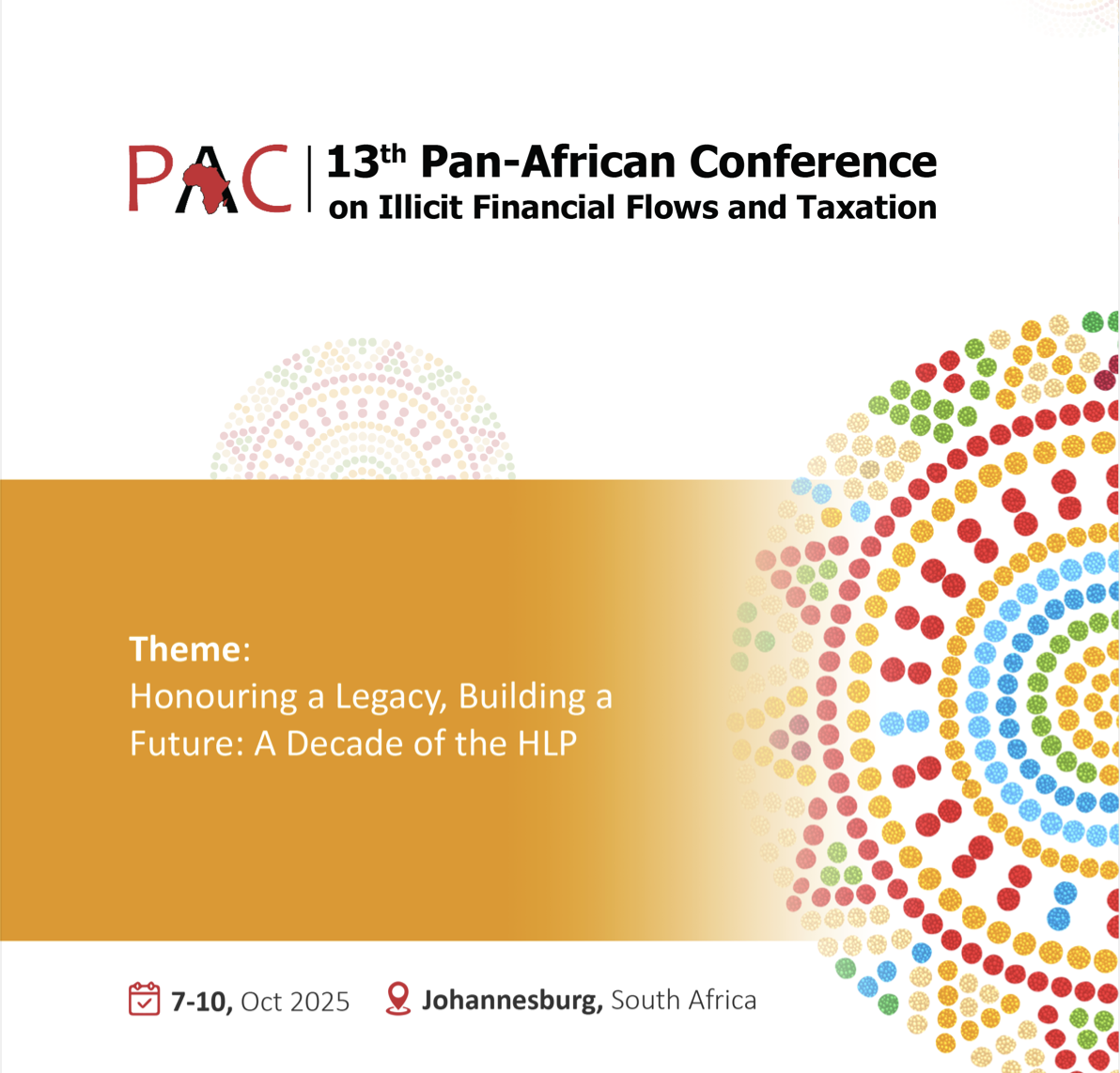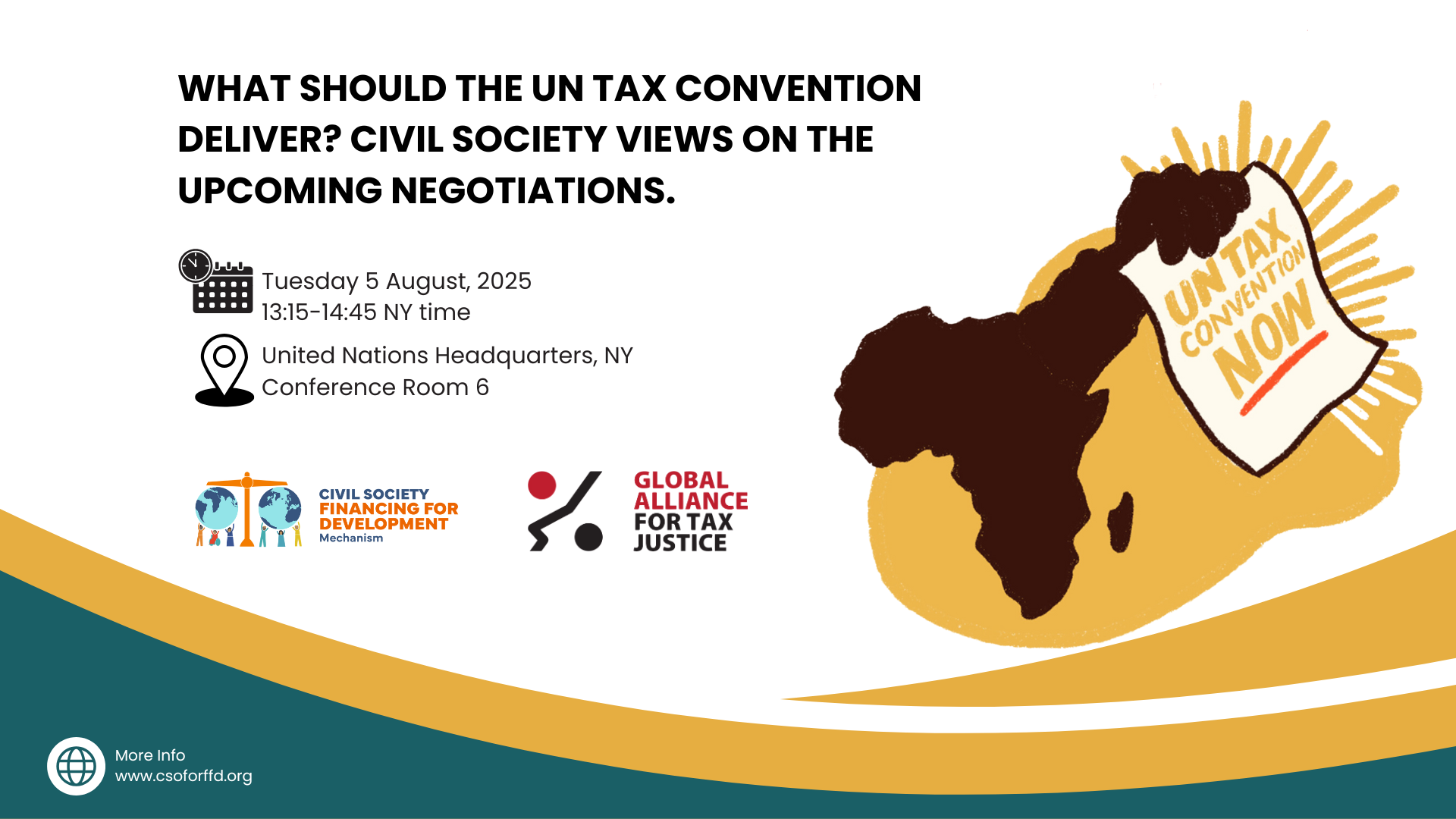
Press Release: Countries Vote in Favour of Negotiating New Global Tax Rules at the UN
The Civil Society Financing for Development (FfD) Mechanism joins members of the Global Alliance for Tax Justice (GATJ) in celebrating the historic outcome of today’s vote and acknowledge the leadership role of the African Group in promoting the reform process of the global tax system in the United Nations on equal footing.

Please refer to original link here: https://globaltaxjustice.org/news/press-release-un-tax-convention-unga/
New York, November 27th – Today, countries at the UN General Assembly overwhelmingly voted to adopt the mandate for the new global tax rules, the Terms of Reference for the UN Framework Convention on International Tax Cooperation (UN Tax Convention). With this vote, UN Member States are now set to begin negotiating the text of the UN Tax Convention and two early protocols in February 2025. The Global Alliance for Tax Justice (GATJ) applauds the adoption of the mandate for the UN Tax Convention as a milestone in the global fight for tax justice.
“Today’s vote is a step forward in the creation of a fair and progressive tax system that supports the wellbeing of all people and the planet,” said Luis Moreno, Chair of the Coordination Committee of GATJ and Representative of RJFALC in reaction to the adoption of the ToR. “Our broken global tax rules presently facilitate the hoarding and hiding of wealth by the super-rich and multinational corporations. This regressive tax system worsens inequalities, as the super-rich grow their billions while the poor are forced to pay the bill.”
Each year, billions of dollars are lost to tax abuse due to loopholes in the international tax system. With this vote, countries have agreed to address key issues of tax abuse, illicit financial flows, the reallocation of taxing rights, and the effective taxation of multinational corporations and the ultra-rich. The mandate will establish an international tax system that is inclusive, fair, effective, and transparent.
“This is the biggest opportunity we have had in a century to reform the global tax system and make it work better for everybody. It is in the interest of all countries to negotiate a fair, effective and ambitious UN Convention on International Tax Cooperation. It is extremely disappointing to see developed countries water down the negotiating text, and then refuse to vote yes to the outcome. We urge them to commit to true international tax cooperation and be more constructive going forward,” said Tove Maria Ryding, Representative of Tax Justice Europe (TJ-E) and Member of the Coordinating Committee of GATJ.
The resolution was adopted today with 125 States voting in support, 46 abstaining, and 9 voting against.
The African Group began the process for a UN Tax Convention in 2023, successfully tabling Resolution 78/230 at the UNGA. Chenai Mukumba, Executive Director at Tax Justice Network Africa (TJNA) and member of the Coordination Committee of GATJ commented, “We congratulate the African Group who has remained resolute in their vision for an international tax system where all countries can participate on equal footing. As a result of their leadership, and unity with the G77, today we begin the historic process for a fair, effective tax system.”
Global tax rulemaking and standard setting has been dominated by the OECD, a platform which has consistently failed to develop tax rules which are inclusive and effective. Holding the negotiations at the UN allows all States to participate on equal footing in the development of the international tax system where negotiations can connect to UN expertise on human rights, gender equality, and sustainable development.
“For too long, unjust tax rules have bound our countries’ hands, blocking them from access to their own tax base and leading to the loss of billions in tax revenues,” commented Dereje Alemayehu, Executive Coordinator of GATJ. “In today’s vote, Global South countries have taken another important step to break out of this outdated system imposed by the ‘rich countries’ club’ of the OECD and to finally establish a tax system in the interest of all countries.” The current allocation of taxing rights prevents source countries from adequately taxing profits made in their own country, an injustice which shall be rectified in the UN Tax Convention.
The creation of a UN Tax Convention has been demanded by Global South countries and civil society for over a decade to attain sustainable, debt-free financing for development and public services. The mandate establishes a UN Tax Convention to support sustainable development. Jeannie Manipon, Co-Coordinator of Tax and Fiscal Justice Asia (TAFJA) and member of the Coordination Committee of GATJ, said: “Decades of unfair global tax rules have contributed to the debt crisis face by many countries in the Global South and loss of revenues for financing essential public services and urgent actions to address the state of climate emergency, Today, as the world tackles climate finance amid a global context of war and hunger, this turning point in the fight for global tax justice offers a precious glimmer of hope for all peoples fighting for a better world.”
As the co-coordinator of the Tax Justice Workstream of the Civil Society Finance for Development Mechanism, GATJ has convened civil society in the fight for a UN Tax Convention, preparing UN submissions and sharing interventions in the negotiations. “Civil society organizations applaud this tremendous step in the fight for fair and effective tax rules. Unlike the OECD, the UN Tax Convention negotiations include the participation of civil society, increasing the transparency, accountability, and effectiveness of this process. We look forward to continuing contributing to the creation of effective and inclusive international tax cooperation,” added Dereje Alemayehu.
Member States will meet back at the UN in February to begin negotiations on the UN Tax Convention and two early protocols to be produced by mid-2027. The first early protocol will be on the taxation of income derived from the provision of cross-border services in an increasingly digitalized and globalized economy. The second early protocol will be decided in February from a short list of topics including illicit financial flows and the taxation of the rich, or “high-net worth individuals.”
ENDS
For more resources:
Watch the vote at the 2nd Committee of the UN General Assembly here.
The Resolution tabled by the Africa Group which was voted upon can be found here.
The Terms of Reference for the UN Tax Convention can be found here.
Contact:
Alexandra Wenzel, Global Communications Coordinator, GATJ alexandra@globaltaxjustice.org, WhatsApp +41 778133732
ABOUT GATJ
The Global Alliance for Tax Justice (GATJ) is a South-led global coalition in the tax justice movement. Together we work for a world where progressive and redistributive tax policies counteract inequalities within and between countries, and generate the public funding needed to ensure essential services and human rights.
Created in 2013, GATJ comprises regional tax justice networks in Asia (Tax & Fiscal Justice Asia), Africa (Tax Justice Network Africa), Latin America (Red de Justicia Fiscal de América Latina y el Caribe), Europe (Tax Justice-Europe) and North America (Canadians for Tax Fairness & FACT Coalition), collectively representing hundreds of organisations. GATJ co-coordinates the Tax justice Workstream of the CS FfD Mechanism.

